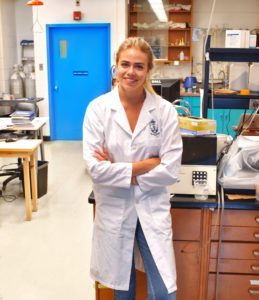Don’t forget to check out Part 1 of our interview with Katheron Intson, where we discussed her background, her research experience in GRIN1, and the reasons behind why she developed Varient. Here in Part II, we will go into more detail about Varient, the importance of data, and how Katheron sees this tool growing in the future.
Developing Varient
Of course, the process of app development took time. From the idea’s initiation to the app’s upcoming launch, Katheron has been working on Varient for just about a year and a half. She began by reaching out to student app developers at the University of Toronto and asking if any of them would be interested in helping to build this tool. 6 engineers came on board. Then, last year, the Varient team won a pitch competition and became backed by a venture capital fund. Now, with a huge engineering team and a group of people who have become increasingly more educated about genetics, Varient is on-track to fundamentally and meaningfully impact the rare disease community.

Right now, says Katheron:
We have a clickable prototype to show people how Varient works and we have a waitlist set-up, which shows that there is not only an actual demand for this app, but that it represents a solution to a real need within the rare disease community.
The waitlist has grown significantly since it opened. When Katheron and I sat down for our interview, two weeks after the waitlist opened, there were 91 families representing 23 rare diseases. Just one week later, the waitlist encompassed over 64 rare diseases. A look on the Instagram page also shows more families eager to get their disease on the list. Due to her background in GRIN1 and genetic epilepsies, Kath initially thought that many conditions on the waitlist would be epilepsy-related. However, she was surprised to see such a wide scope of conditions, including hemophilia, mitochondrial disorders, and osteogenesis imperfecta (among others).
The Importance of Data
Kath has always recognized the importance of data and used that as a cornerstone for Varient. But its true importance became clear when:
One of the families that I was in contact with, their son died, and that profoundly affected me. I didn’t sleep for weeks. As I was thinking about them, it really hit me that we need to have a better way to manage symptoms. A better way to share medication statistics. A better way to truly help these families and give them insights that they need to care for their children. And that was what drove me.
One of her focuses in creating Varient was developing an option for families to receive quantified medication outcomes – understanding what therapies have worked for other children who are genetically similar so that families and patients can receive the best treatment possible. The front page of the Varient website reads:
Finding the right medicines for your rare genetic disease doesn’t have to be so lonely, scary, and experimental. Varient helps you find others with the same rare disease and genetic variant to find out what’s worked, and hasn’t worked, for them, reducing the time and risk it takes to find symptom relief.
So, as you might have guessed, Varient relies a lot on data from families. Kath stressed that the company, in terms of data custody, will follow best practices; data will be de-identified, aggregated, and stored safely, with name encryption. Varient is GDPR and HIPAA compliant, and families are free to delete their data at any time.
But what happens to families whose children do not respond well to available treatments? Well, says Kath, their information and data is just as valuable. She explains:
In the future, we can take all of this data to pharmaceutical companies and say, ‘Look, for this condition, nothing is working. We need gene therapy, we need better medication.’ For families where there is no good news, the reward process takes a bit longer. But the idea is that we can one day be a clinical trial liaison between them and pharma so that when pharma begins a clinical trial for their rare disease, we can put it on the app and give these families the choice to enroll. Plus, the data we provide is dynamic, so if your family hasn’t found something that is effective, they can check back in from time-to-time. We’re continually updating the data as people provide it so we may, in the future, have good news for these families.
Growing Varient: A Look Ahead
Looking ahead, Katheron anticipates that Varient will grow in the future. First, she explains that she hopes to collaborate with companies that are looking to develop treatments or cures to help advance rare disease research. She also believes that working with foundations to help connect families within a certain disease space. For example, if a foundation is working with many families on the East Coast, but Varient knows many families on the West Coast within that disease community, Varient can encourage the foundation to do more outreach in certain regions.
Additionally, Katheron hopes that Varient will be helpful to academic researchers, creating an open-source relationship within a trusted research environment. However, no contact information or identifying information would be shared.
Varient has the potential to keep growing and advancing research in numerous disease states. Right now, the focus is on rare variants because these mutations cause life-threatening conditions or have the potential to reduce quality-of-life. When asked how many rare diseases she would eventually like to see on Varient, Katheron said:
All of them. Our goal is to have every genetic disease where people want to manage their symptoms. If there’s a medication for a rare disease already, we still want to know whether that medication is good or not. We want to be able to help everybody with a rare disease. That’s when I’ll be happy.
A Final Note
50 years ago, you could go to the doctor with symptoms and receive a broad diagnosis – autism, epilepsy, hemophilia – before you were sent on your way. Patients were given generic drugs to see if they helped. As genetic testing has expanded, in 90% of cases, there is a pinpointed singular causative genetic variant.
We are also learning that variants can make us susceptible to develop depression, Alzheimer’s, or a number of other common conditions.
Even outside of Varient, Katheron is committed to helping those around her. She often sits down with parents to translate medical terminology – regarding genes and functions – to them in plain language. She aims to help people become empowered, both within their own lives and when speaking to doctors or researchers. When families contact her, she refers them to foundations, walks them through published research, or connects them with clinicians.
Her drive and determination have helped shape her into an important resource for everyone that she comes into contact with.
Moving forward, we know that Varient will do wonderful things for the rare disease community. So don’t wait to join the waitlist! To all rare patients and families, join the waitlist today and help accelerate rare disease research into your condition once your community launches.





